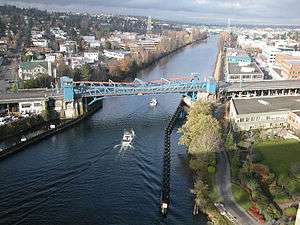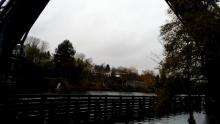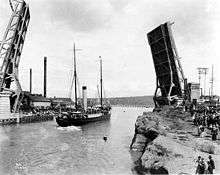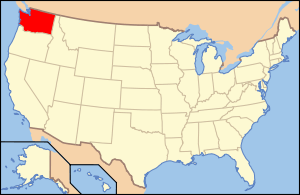Fremont Bridge (Seattle)
| Fremont Bridge | |
|---|---|
 The Fremont Bridge from the George Washington Memorial Bridge | |
| Carries | Fremont Avenue N |
| Crosses | Fremont Cut |
| Locale | Seattle, Washington |
| Maintained by | Washington State DOT |
| Characteristics | |
| Design | bascule |
| Total length | 502 feet (153 m) |
| Longest span | 242 feet (74 m) |
| Clearance below | 30 feet (9.1 m) |
| History | |
| Opened | June 15, 1917 |
| Designated | December 28, 1981[1] |
|
Fremont Bridge | |
| Location | Spans Lake Washington Ship Canal, Seattle, Washington |
| Coordinates | 47°38′51″N 122°20′58.8″W / 47.64750°N 122.349667°WCoordinates: 47°38′51″N 122°20′58.8″W / 47.64750°N 122.349667°W |
| Area | less than one acre |
| Built | 1917 |
| MPS | Historic Bridges/Tunnels in Washington State TR |
| NRHP Reference # | 82004234[2] |
| Added to NRHP | July 16, 1982 |


The Fremont Bridge is a double-leaf bascule bridge that spans the Fremont Cut in Seattle, Washington. The bridge, which connects Fremont Avenue North and 4th Avenue North, connects the neighborhoods of Fremont and Queen Anne.
The Fremont Bridge was opened on Friday June 15, 1917, at a cost of $410,000.[3] The first traffic over the bridge was to "owl cars", the last run of the trolleys, and then after 5am the same day to all other traffic. The Lake Washington Ship Canal was dedicated on July 4, 1917, which has caused confusion about the opening date, for this bridge crosses the canal. The Fremont Bridge is the first of four city bascules to cross the canal, the others being Ballard Bridge (1917), University Bridge (1919), and Montlake Bridge (1925). The bridge was added to the National Register of Historic Places in 1982, and is also a designated city landmark, ID #110347.[4]
Due to its low vessel clearance of 30 feet (9.1 m),[5] the Fremont Bridge opens an average of 35 times a day, which makes it the most frequently opened drawbridge in the United States and one of the busiest bascule bridges in the world.[6] Federal law gives marine traffic the right-of-way over vehicular traffic, however the Fremont Bridge is closed to most water traffic during rush hours.[7]
The bridge's blue and orange color was chosen by voters at a 1985 street fair.[8]
In 2006, the Fremont Bridge underwent a $41.9 million restoration project to replace the approaches and maintenance shop, as well as renovation of the mechanical and electrical systems that operate the bascule.[9] The approaches were completed in May 2007[10] and testing lasted through the Spring of 2008.[11] In 2014 the city began repainting the bridge.[12]
References
- ↑ "Landmarks and Designation". City of Seattle. Retrieved March 5, 2013.
- ↑ National Park Service (July 9, 2010). "National Register Information System". National Register of Historic Places. National Park Service.
- ↑ Holstine, Craig E. (2005). Spanning Washington : Historic Highway Bridges of the Evergreen State. Washington State University Press. pp. 103–104. ISBN 0-87422-281-8.
- ↑ Landmarks Alphabetical Listing for F, Individual Landmarks, Department of Neighborhoods, City of Seattle. Accessed December 28, 2007.
- ↑ "Bridges and Roadway Structures: Bridge Openings". Seattle Department of Transportation. Retrieved January 23, 2010.
- ↑ "Bridges and Roadway Structures". City of Seattle. Retrieved May 20, 2007.
- ↑ "Bridges and Roadway Structures: Bridge Openings". Seattle Department of Transportation. Retrieved May 20, 2007.
- ↑ Broom, Jack (July 5, 2002). "Big for our bridges". The Seattle Times. Retrieved May 20, 2007.
- ↑ "Fremont Bridge will close overnight this week". Seattle Post-Intelligencer. May 13, 2007. Retrieved May 20, 2007.
- ↑ "All Lanes Of Fremont Bridge Open". KIRO. May 18, 2007. Retrieved May 20, 2007.
- ↑ "Fremont Bridge Approaches Replacement Project". Seattle Department of Transportation. Retrieved May 20, 2007.
- ↑ "Safely Painting the Fremont Bridge". Seattle Department of Transportation. Retrieved February 5, 2015.
External links
- William C. Ruegnitz Papers. 1906-1944. 1.68 cubic feet (5 boxes). At the Labor Archives of Washington, University of Washington Libraries Special Collections. Contains details about the location, list of materials and their estimated cost of the Fremont Bridge.
| Wikimedia Commons has media related to Fremont Bridge. |

